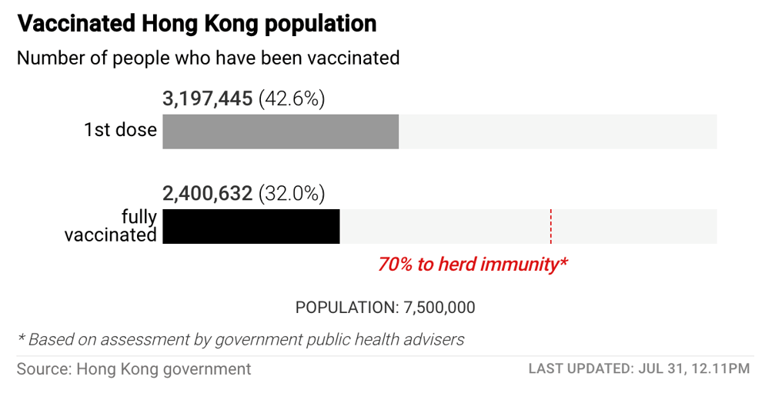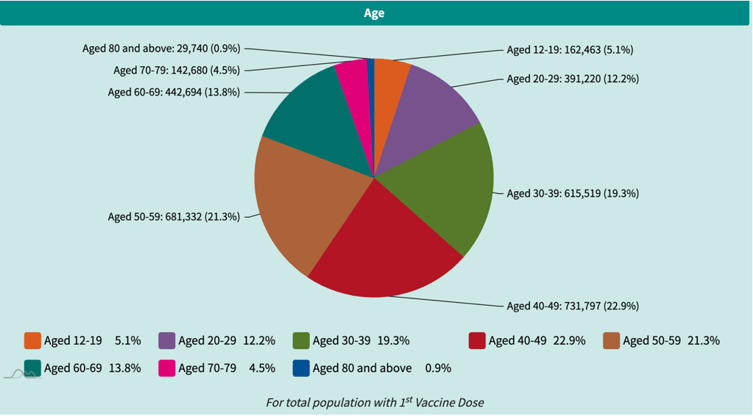If Herd immunity cannot be achieved by vaccination alone, Hong Kong needs to acknowledge this fact and focus on minimising the inevitable harm resulting from the process of achieving population immunity at least in part through natural infection.
Why Do We Vaccinate People?
Ultimately all vaccinations work in two different ways:
1. Direct immunity:
This deals with the question: If I am immunized, how much less likely am I to die or become seriously ill from a disease? This is about direct benefit to the individual. Covid vaccinations are extremely effective in preventing death and serious disease on an individual basis. 99% of deaths in the US are currently occurring in non-vaccinated individuals. Breakthrough infections in vaccinated individuals do occur but they will generally be much less serious.
2. Indirect (Herd Immunity):
This deals with the question: If lots of people in the population are vaccinated, will people who have not been vaccinated (or whose vaccination has not been effective) also be protected? This is a measure of benefit to the population.
When enough of the population is immune to an infectious disease, they provide indirect protection (herd immunity) to those who are not immune. The herd immunity threshold is the point at which so many people have immunity that the disease can no longer thrive and the epidemic dies. It is likely that the UK has reached, or is very close to reaching, this threshold and the epidemic is dying.
It is important to understand that the herd immunity threshold can change over time. It gets further away as the virus becomes more infectious, with less effective vaccination, as immunity wanes due to natural decay and as populations get more dense with reduced social distancing. For these reasons, the UK and other locations which reach herd immunity may temporarily lose that population protection over the winter or with the rise of new variants. If that happens, population immunity will need to be boosted with further vaccination or possibly naturally by episodic infections. I discussed this issue with Professor Ben Cowling in a recent Podcast.
Can Hong Kong Reach Herd Immunity?
We have explained in another article why the factors above mean that it is not possible for Hong Kong to achieve herd immunity by vaccination alone. Locations that seem to be close to herd immunity have acquired this population immunity from a combination of immunisation and infections.
High vaccine coverage is a good thing. If Hong Kong vaccinated 100% of the population, people would be safe because 100% of the population would be protected individually by vaccination. Unfortunately we will not be able to vaccinate 100% of the population. Apart from vaccine hesitancy, we cannot yet vaccinate young children. The arguments for vaccinating older children and adolescents are balanced. Covid is generally a mild disease in the young and whilst there are arguments for vaccinating children to prevent both rare serious illness and the potential harm of Long Covid, it must be unethical to vaccinate children if the primary purpose is to protect the predominantly elderly population rather than the child.

Fig 1. ‘70% to herd immunity’: A familiar refrain which is factually incorrect. 70% vaccination with a mixture of Sinovac and BioNTech vaccines alone will NOT be enough to reach herd immunity. This is misinformation.
Hong Kong needs to challenge the current narrative that focuses on the purpose of vaccinations as primarily being to lead to herd immunity. We need to move away from the false assertion that vulnerable members of our community will be safe when the population vaccination level hits 70% and towards an emphasis on the importance of this population getting vaccinated so that they are protected when the disease inevitably gets into our city.
If high vaccine coverage is a good thing, does it really matter what we call it?
Yes, it really does matter how we define our strategy. If 70% vaccine coverage was enough for herd immunity it wouldn’t really matter which 70% of our population we vaccinate because everybody would be indirectly protected. If 70% is not enough for herd immunity then it matters a great deal who we vaccinate.
How old you are and how healthy you are makes a significant difference to how likely you are to die of Covid. A 75-year-old is 9x more likely to end up in intensive care and 230 times more likely to die than a 20-year-old. At 85 years of age, intensive care admission is 15x more likely and death 600x more likely. Hong Kong currently has very low vaccine uptake among the most vulnerable members of the population. Only 5% of residents in elderly care homes are vaccinated.
What should the strategy be?
Ultimately zero Covid is not a long-term strategy. Unless we stay locked down forever the only possible solution will be to achieve population immunity by a combination of vaccination and natural infection. The challenge will be to acquire such natural immunity with the minimum impact on the health of the population. This requires a structured top-down strategy for vaccinating the elderly, the prison population and other high-risk groups. Singapore has already defined a path towards ‘living with Covid’ based upon high vaccination rates with effective vaccines and a focus on the most vulnerable down. This process will take some time and inevitably there will be lessons to be learned as the process unfolds but it is a clear and rational roadmap.

Fig. 2: Percentage of first vaccinations given by age in Hong Kong: Data from HK Government dashboard.
Hong Kong needs high vaccine uptake. For the reasons previously described it will not be possible to achieve herd immunity in our city without some natural infections. In terms of the negative impact both to individuals and to the health system, we would be much better vaccinating 50% of the most vulnerable members of our community than we would by vaccinating 70% of the least vulnerable. By focusing on herd immunity, we are not focused on our only potential effective strategy which is to develop high vaccine coverage from the most vulnerable down. There is currently too much focus on an illusory number and not enough emphasis on where the real risk lies. 70% is a perfectly reasonable number to choose but only if it covers a significant majority of the most vulnerable. Mortality from Covid is hundreds of times more likely over 70 years of age than under 30 years of age. We have currently vaccinated 3x as many under 30s as over 70s.
Hong Kong has made a political decision to continue with zero Covid in an attempt to form a bubble with the mainland. This is a political decision for which there are good economic arguments. However, in the long term, we must use this time to optimise vaccination by focusing strategically on the areas of greatest risk. This approach requires an emphasis on education and possibly revisions to the legislation around vaccination for residents in elderly care homes and care workers. Most importantly, this requires a strategy and a plan. It is impossible to keep Covid out of the city forever and we must therefore use this time to minimise the inevitable harm from the eventual rise in natural infections.
 Central General Practice
Central General Practice
 Repulse Bay
Repulse Bay
 Clearwater Bay
Clearwater Bay
 BodyWorX Clinic
BodyWorX Clinic
 Central Specialist Clinic
Central Specialist Clinic
 MindWorX Clinic
MindWorX Clinic
 Partner Clinics
Partner Clinics
 Family Clinic
Family Clinic
 OT&P Annerley Midwives Clinic
OT&P Annerley Midwives Clinic





